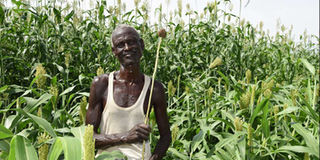New way of life for pastoralists

Mzee Joseph Ata Apokon, at his plot in Katilu Irrigation Scheme, Turkana South Constituency of Turkana County, which is under the National Irrigation Board, holds a stick with clay on one end which he uses to scare birds from eating sorghum. PHOTO | JARED NYATAYA | NMG
What you need to know:
- Besides Abakon, tens of other farmers are also growing various crops at the scheme, located off the Kainuk-Lokichar-Lodwar Road.
- Besides sorghum, there is sukuma wiki, watermelons, tomatoes, bananas, paw paws and mangoes.
The sweltering Turkana heat is unforgiving, but one man is defying it to grow sorghum.
Joseph Ata Abakon, 70, grows the crop at Katilu Irrigation Scheme in Turkana South.
The farmer has found solace in farming after years of straddling the dry lands of Katilu looking after cows and goats.
When the Seeds of Gold team met him last week, he was in a vest and a pair of shorts busy battling warding off birds that were feeding on his crop, denying him harvest.
“I have to wake up as early as 6am to scare them away. I do not go anywhere until 7pm. This is what I do the whole day. I will not get harvest if I leave this place,” said Abakon.
His grandsons, who have learned the art of using a sling, join him in chasing away the birds.
Besides Abakon, tens of other farmers are also growing various crops at the scheme, located off the Kainuk-Lokichar-Lodwar Road.
The scheme was expanded eight years ago to accommodate more farmers. Initially, it was under the Food and Agriculture Organisation but was taken over by the National Irrigation Board (NIB) in the early 2000s.
The board gave it a new lease of life, but it was not until few years ago when it was expanded and locals involved.
Daniel Waweru, the scheme’s operations manager, said they have 1,800 farmers occupying 2,000 acres.
Besides sorghum, there is sukuma wiki, watermelons, tomatoes, bananas, paw paws and mangoes.
“We do not charge them any fee. Our work is to facilitate and ensure the right crops are planted here,” he said.
The bulk of the produce is sold at Kakuma Refugee Camp, hundreds of kilometres away.
“Last week we sent 1,400 melons to Kakuma for sale. A lorry full of sukuma wiki also left for the refugee camp. Our farmers are doing well because of the ready market for their produce,” Waweru said.
Katilu scheme relies on River Turkwel for the year-long production and the water is redirected through canals and channelled to the farms via furrows.
Waweru said they have two planting seasons every year. First, is in first quarter of the year and the other from July. They encourage farmers to different crops each season.





